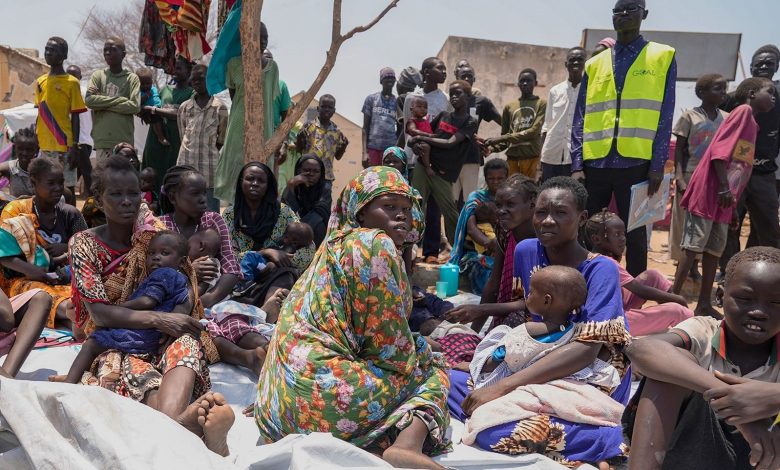RSF: A Bet on a Losing Horse

Report – Sudan Events
Nearly 25 million people are in need of humanitarian aid in Sudan. And the raging war in Sudan has unleashed the largest displacement crisis in the world, uprooting the lives of more than 7 million people, with about 1.4 million of them crossing into neighboring countries that are already hosting a large number of refugees. The question then is who is igniting this flame and fueling the fire of the raging conflict in the Sudan?
Mercenary support
Intelligence reports say that the United Arab Emirates is financing the mobilization of thousands of mercenaries to support the Rapid Support Forces (RSF) in Sudan as part of its plot to spread chaos, ignite conflicts, and pave the way for the plunder of the country’s wealth and resources. With more than eight months since the outbreak of the conflict in Sudan, observers are increasingly concerned about the danger of impact of the mercenaries’ who flock from Chad, Mali and Niger to fight alongside Mohamed Hamdan Dagalo, the ally of Abu Dhabi.
The United Nations is observing
The United Nations has been monitoring for months the growing phenomenon of mercenaries, including foreign fighters, who are allied with the RSF in their conflict with the Sudanese army. These mercenaries come from regions such as the Sahel, Mali and Niger, as stated in a report by the Emirati Leaks website.
Emirati funding for mercenaries in Libya
In this context, Andreas Krieg, assistant professor in the Department of Security Studies at King’s College London, stated that Chadians have actually joined the RSF in recent years for the sake of salaries.
He added that the areas under the control of retired Major General Khalifa Haftar in eastern Libya constitute a center for delivering weapons to the RSF.
Krieg noted that the UAE sent tons of weapons to General Khalifa Haftar in 2019 and 2021, and they can now be provided to the RSF without being tracked.
He pointed out that the UAE supports the commander of the RSF, Mohammed Hamdan Dagalo “Hemedti,” who amassed wealth from gold smuggling, with outlets to direct his financial investments. In addition, the UAE has harnessed its networks to create a center of influence and public relations for the RSF.
Permanent custom
This is not the first time that the UAE has engaged in such practices. In 2020, investigations conducted by the Inspector General for Counter-Terrorism Operations at the US Department of Defense revealed that the UAE is financing Russian Wagner Group mercenaries in Libya. The American magazine Foreign Policy published a report at the time, prepared by Jack Deitch and Robbie Grammer, in which it was confirmed that Abu Dhabi helps finance the Russian Wagner Group, and the authors relied on the report of the Inspector General for Counter-Terrorism Operations.
It seems that the UAE was not satisfied with the broad military support for its ally, Dagalo, but also expanded its support by recruiting foreign mercenaries into the ranks of the RSF.
Intense mobilization of mercenaries
Emirati reaction: Informed sources previously revealed that the instructions of Emirati President Mohammed Bin Zayed to counter the statements of the Deputy Commander of the Sudanese Army, Yasser Al-Atta – in which Atta accused the UAE of supporting Hemedti – were quickly translated into an influx of thousands of mercenaries from Chad, Mali, and Central Africa, and these mercenaries are being deployed to support the RSF militias. These were the same groups that supported Khalifa Haftar in Libya.
Losing bet
The Sudanese writer and analyst Al-Fadil Ibrahim commented in a statement to Al-Quds Al-Arabi that the UAE’s bet on Hemedti is a losing bet, for several reasons, including the distortion of the image of RSF in an irreparable way. Perhaps countries and political elites thought before the war of dealing with it as a potential partner in the political transition process, but the current view today is considered a genocidal militia.
The second reason is the possibility that the RSF will not win because it focused on Khartoum and its original homeland, Darfur. Therefore, these forces stationed themselves in neighborhoods and seized civilian infrastructure to wage a war they knew that Sudanese Armed Forces (SAF) could not win without destroying the capital and battle-torn cities in Darfur such as Nyala, El Fasher and El Geneina. This created a deadlock, setting the country up for a prolonged state of war.
The third reason is the distortion of the UAE’s image among the Sudanese due to its relationship with the paramilitary group, which will limit its influence on the future of Sudan. It is known that the democracy advocates who overthrew Omar al-Bashir in 2019 were clear in their opposition to the UAE and Saudi Arabia, which supported the transitional council in which the army and the RSF participated.
The final reason is that the economic and strategic interests of the UAE are located in the areas controlled by the Sudanese Armed Forces. The multi-billion dollar Red Sea port of Abu Umama, which was to be developed by Abu Dhabi Ports Group, and the hundreds of thousands of fedans of arable lands developed and slated to be planted by UAE development Funds and companies, are largely located in states controlled by the Sudanese Armed Forces.
Nine months of conflict, flee here, run there: Is the UAE still convinced to support the Janjaweed, or do you think it will admit that it once bet on a losing horse?



